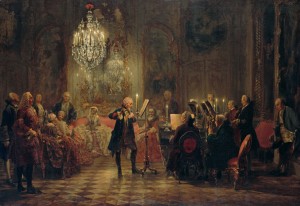Baby Bach ribs
No BBQ here. Just a really stupid joke.
All the Bach children were musical, and probably not by choice. Most musicians agree that Carl Philipp Emanuel Bach was the best composer among them. After all, when Mozart said “Bach is the father, and we are his children,” he was not referring to J.S., but C.P.E.
C.P.E.’s music is a perfect midpoint between the Baroque and Classical musical eras, combining the ornateness and richness of the baroque with the transparency and grace of the classic. This isn’t the heavy, confusing sound of his father’s late compositions, nor is it the mindless, simple noodling of Scarlatti.
Shortly after graduating with a degree in law (like any good musician does), he was appointed a musical post in the court of Frederick the Great, who was known as a great patron of the arts, and was himself a flutist. It’s easy to imagine this flute concerto being performed by Frederick, with C.P.E. conducting and playing the keyboard, as is portrayed in this painting.


Recent Comments